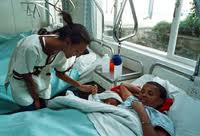Yadav Featured On Global Michigan Site
Tuesday, July 15, 2014
WDI Director of Healthcare Research Prashant Yadav is in Ethiopia researching the country’s health care system. He was interviewed by the Global Michigan website editor William Foreman about the growth the country is experiencing. Foreman is in Ethiopia chronicling the university’s growing work in that country, and will feature a future blog post on Yadav’s work there.

To read the Global Michigan blog post featuring Yadav, click here.
Click here to read the Global Michigan blog series on Ethiopia.
Additionally, WDI Global Impact Intern Nancy Kasvosve is in Ethiopia this summer working as part of Yadav’s student team. Click here to read her blog posts on her summer abroad so far.
And here is an article from earlier this winter on WDI’s involvement in Ethiopia:
WDI Joins U-M’s Efforts In Ethiopia
Over the last five years, Ethiopia – with the help of the University of Michigan – has made steady progress in addressing the challenges it faces in human resources for health.
Strong leadership has resulted in an increase in the number of trained doctors, nurses, and all other levels of healthcare professionals. More than 12 new medical schools have become operational in the last few years and enrollment at existing medical schools has increased.
As a part of its commitment to U-M’s Ethiopia Initiative, WDI healthcare research director Prashant Yadav conducted an intensive program on leading, managing, and organizing health delivery systems in resource limited settings in November. More than 120 recently graduated doctors from Mekelle Medical College attended the program held at the Ethiopian Management Institute in Debre-Zeit.
“Through better understanding of operations management, health financing and pharmaceutical supply systems, the new wave of Ethiopian doctors can lead their clinics, hospitals and districts with greater confidence,” Yadav said.
Student learning is best achieved through experience, inquiry, critical thinking and interaction with other learners, Yadav said, which were strongly embedded into the pedagogical approach used in Ethiopia.
Dr. Senait Fisseha, an associate professor in the Department of Obstetrics and Gynecology at the U-M Medical School, leads the university’s collaborative efforts in Ethiopia. The core of U-M’s partnership centers on building the research, teaching and clinical service capacity of St. Paul Hospital and Millennium Medical College (SPHMMC) in Addis Ababa, Ethiopia.
Making real improvements in the health system under the most difficult circumstances requires good managerial skills. A vast majority of new graduates from Ethiopian medical schools end up having responsibilities that include managing multiple aspects of health service delivery for an entire district, including financial, human resources, pharmaceutical supply and other such functions.
“Physicians in healthcare systems in Ethiopia have an extremely demanding job,” Fisseha said. “Apart from clinical care, better management is often at the center of their roles. Prashant’s module was the start of a process to make management training more deeply embedded into the system in Ethiopia.”
Next year, the WDI team also will work on projects related to essential medicine supply chains in Ethiopia.
